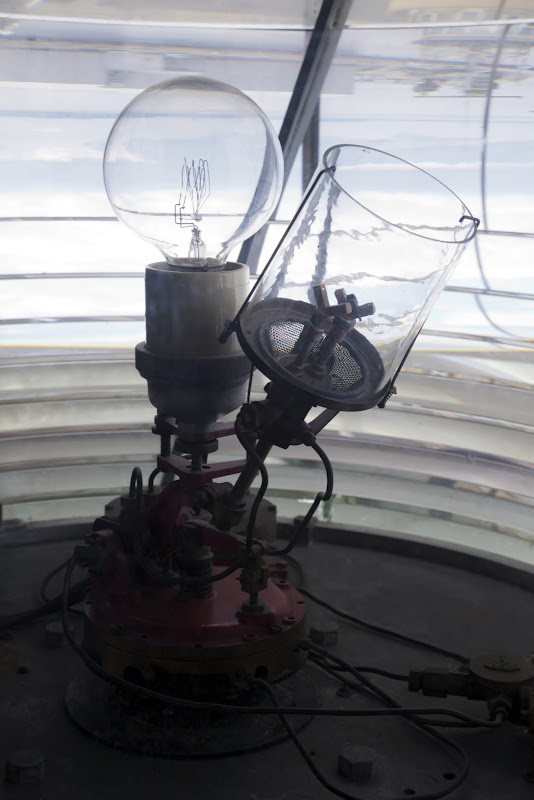Yksi kauneimmista majakoista Pohjois-Euroopassa (maantieteellinen sijainti 54 ° 24'28'' N, 18 ° 39'50'' E), tämä 90 jalkaa pitkä rakenne on rakennettu vuonna 1893 ja otettu käyttöön vuonna 1984. Se oli myös ensimmäinen majakka Itämerellä, joka käytti sähköä.
Majakka sijaitsee Gdańskin sataman suulla, Nowy Port majakka yhdistää kolme erillistä osaa: se on majakka, lentäjien torni ja aikapallo. Kuten Greenwichissä, Englannissa, majakassa on aikaa mittaava pallo, mitataan 5 metriä halkaisijaltaan ja painoa 150 kiloa. Pallo laskee joka päivä aikaa ja antaa tarkkaa aikasignaalia aluksille Gdańskinlahdella.
Gdańsk Nowy Port majakasta tuli kuuluisa maailman historiassa 1. syyskuuta 1939, jolloin siitä klo 04:45 tuona päivänä Saksan armeija avasi tulen Puolan armeijan etuvartioon Westerplatten vastakkaisella puolella jokea. Tästä alkoi toinen maailmansota, sota, joka vaati 55 miljoonaa henkeä. Kolme minuuttia myöhemmin, klo 04:48 Saksan taistelulaiva Schleswig-Holstein aloitti pommitukset Westerplatteniin.
Vuonna 1984, kun uusi, moderni majakka rakennettiin pohjoisessa sijaitsevaan Gdańskin satamaan, Gdańskin Nowy Port poistettiin käytöstä, siitä tuli hylätty ja unohdettu. Vasta vuonna 2001 se peruskorjattiin ja avattiin yleisölle vuonna 2004. Lisäksi vuonna 2008 majakan aikapallo kunnostettiin, ja nyt laskee aikaa, kellon tarkkuus 1 sekunnin virhe 200 000 vuodessa!
Gdańsk Nowy Port majakka, Grand Old Dame Gdańsk on usein kuvattu, kaunein, mielenkiintoisin ja parhaiten säilynyt majakka Puolan rannikolla. Tämä historiallinen monumentti myös tarjoaa kävijöilleen mahdollisuuden ihailla sen ainutlaatuista arkkitehtuuria ja vertaansa vailla olevia näkymiä Gdańskin satamaan, Westerplattenille, ja koko Gdańskinlahdelle, kuten Helin niemimaalle.

One of the most beautiful lighthouses of Northern Europe (geographical
position 54°24'28''N, 18°39'50''E), this 90-feet-tall structure was
built in 1893 and put in service in 1984 and, according to a legend, it
was a twin of the most beautiful lighthouse of America - the lost Main
Lighthouse of Cleveland, Ohio. It was also the first lighthouse on the
Baltic Sea to use electricity.
Situated at the entrance of the harbor of Gdańsk, the Nowy Port
lighthouse combined three distinct functions: that of a coastal
lighthouse, a harbor pilots tower, and a time ball station. Like in
Greenwich, England, the time ball, which measured 5 feet in diameter and
weighed 150 pounds, dropped every day at noon to give a precise time
signal to the captains of the ships lying at anchor in the Bay of
Gdańsk, to allow them to adjust their chronometers, which in turn
allowed them later to establish their ship's position (more precisely
the longitude) on the open sea.
The Gdańsk Nowy Port Lighthouse entered world history on September 1,
1939, when from its embrasures at 4:45 a.m. of that day the German army
opened fire on the Polish military outpost of Westerplatte on the
oposite side of the river, thus starting World War II, a war which
claimed 55 million lives. Three minutes later, at 4:48 a.m. the German
battleship Schleswig-Holstein began shelling Westerplatte in its turn.
In 1984, when a new, modern lighthouse was built in the Northern Port of
Gdańsk, the lighthouse of Gdansk Nowy Port was decommissioned,
abandoned and forgotten. It was only in 2001 that a Canadian with roots
in Gdańsk acquired it from the Polish government and after extensive
renovation and conservation work opened it to the public in 2004 as a
museum. Inside the historic monument one can admire old optical and
electrical instruments from the era long gone by, as well as a superb
exhibition of the most beautiful lighthouses of the world.
In addition, in 2008 the lighthouse's time ball was restored, and now
drops every day at 12 o'clock noon and then at 2, 4 and 6 pm, with the
accuracy of 1 second cumulative error in 200 000 years!
The Gdańsk Nowy Port Lighthouse, the Grand Old Dame of Gdańsk, is often
described as the most beautiful, most interesting, and the best kept
lighthouse of the Polish coast. This historic monument also offers its
visitors a chance to admire its unique architecture and an unsurpassed
view of the Gdańsk Harbor, Westerplatte, and the whole Bay of Gdańsk,
including the Hel Peninsula.

















0 kommenttia:
Lähetä kommentti